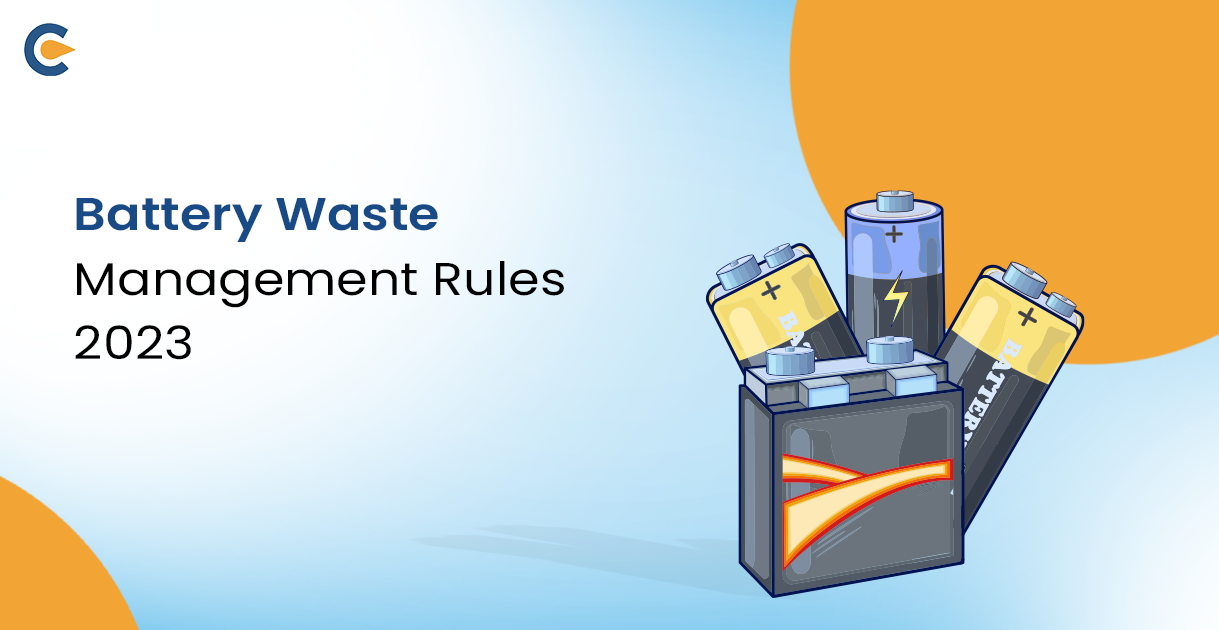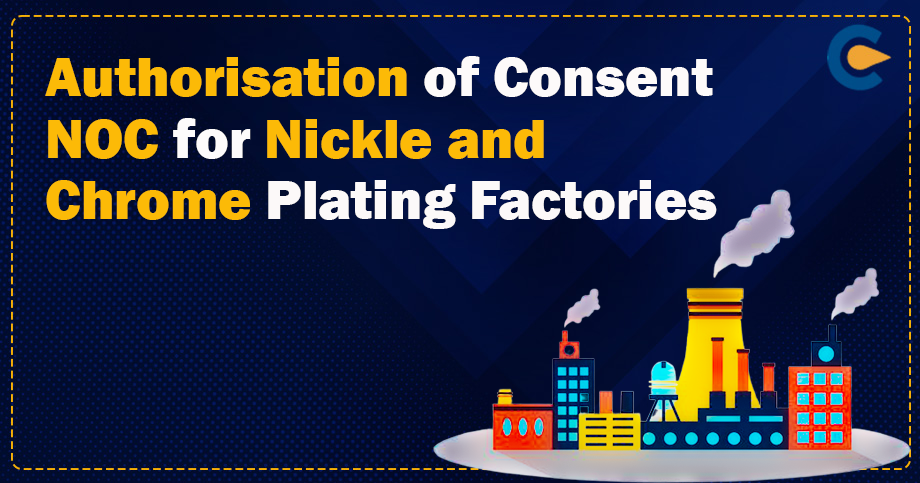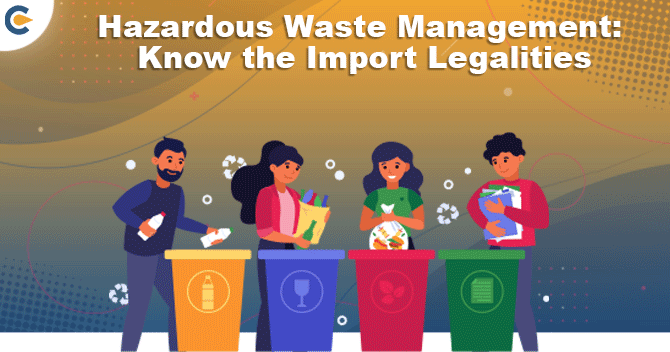An increasingly important aspect of environmental sustainability is battery waste management, which is becoming more and more important as advances in technology cause a boom in the use of batteries in a variety of industries. In India, where the population is increasing and the economy is expanding quickly, it is critical to solve the issues around battery waste.
Benefits of complying with Battery Waste Management Rules 2023
- With the compliance of battery waste management rules 2023, proper battery waste management can be done.
- The environment can be protected more efficiently by complying with Battery Waste Management Rules 2023.
- With compliance with Battery Waste Management Rules 2023, battery recycling can be made effective.
- The toxic materials are disposed of efficiently with battery waste management rules 2023 compliance.
- Compliance with Battery Waste Management Rules 2023 can result in an impact on global environmental protection.
What is EPR Authorization for Battery Waste Management?
Battery waste authorization under Extended Producer Responsibility (EPR) is a major regulatory strategy intended to support environmental sustainability and appropriate disposal of used batteries. According to the EPR principle, battery producers, importers, and manufacturers are accountable for the full lifespan of their goods, from manufacture to disposal. This implies that businesses have a legal duty to take action to guarantee that spent batteries are gathered, recycled, and disposed of in an ecologically friendly way.
Establishing collecting networks, recycling facilities, and secure disposal techniques for end-of-life batteries are usually part of the EPR authorization process for battery waste. To lessen their negative effects on the environment and encourage the conservation of important resources, manufacturers and importers are responsible for providing the funding and organizing the collection and recycling of these batteries.
Producers under Battery Waste Management Rules
There are some obligations that are to be fulfilled by the Producers under Battery Waste Management Rules:
- The Battery Waste Management Rules were first introduced by the Ministry of Environment, Forest and Climate Change. The Battery Waste Management Rules have also obtained some amendments in the year 2023, referred to as Battery Waste Management Rules 2023.
- The Battery Waste Management Rules 2022’s Rule 4 states the mandatory obligation to have an EPR for batteries before their introduction to the market.
- When the batteries are introduced by the producers in the market, it is mandatory for the producers to take the extended producer responsibility (EPR) for the batteries.
- The EPR obligation is an important requirement to ensure that the batteries introduced in the market are in compliance with the environmental obligation laid in the country to preserve the environment.
- The recycling and refurbishing of batteries are to be carried out in alignment with environmental obligations.
- The EPR certificates aid the producers under the battery waste management rules in fulfilling their EPR obligation for the recycling and refurbishing of batteries as per Schedule II (v) of the Battery Waste Management Rules of the year 2022.
- The online portal of the EPR generates the certificates for the extended producer’s responsibility.
- In order to obtain the EPR certificates, the producers of batteries are required to engage with registered waste battery recyclers.
- When a producer is facing problems like the EPR credits not being generated or transferred by the waste battery recyclers, they can report such incidents on the EPR portal, and the Central Pollution Control Board can then take action for the same.
- Appropriate actions can be taken against the producers that do not follow the battery waste management rules 2023 and are not in compliance with EPR obligations that are mandatory for all battery producers.
- In case of the absence of an EPR certificate, all the battery producers are advised to collect the EPR certificates as per the targets allocated.
- Non-compliance with any rules which are mentioned in the Battery Waste Management Rules 2023 and 2022 can lead to actions against the entities that are not fulfilling their duties under the Battery Waste Management Rules 2023 and 2022.
What are the Battery Waste Management Rules 2023?
Some of the key points in Battery Waste Management Rules 2023 are:
- “Battery” Definition: The term “Battery” now refers to both new and reconditioned cells or batteries, as well as accumulators, which are used to produce electrical energy directly from chemical energy. It also includes disposable main or secondary batteries under this definition.
- Extended Producer Responsibility (EPR): As of right now, manufacturers of batteries that they release onto the market must follow EPR guidelines. This duty entails making certain that used batteries are recycled or restored in accordance with Schedule II of the regulations.
- Producers must comply with the collection, recycling, and refurbishing objectives outlined in Schedule II for all batteries and battery packs that are sold in the market, including those that they utilize for internal use.
- Registration: Through a centralized online platform, producers must register with the Central Pollution Control Board. As of right now, the Board’s registration certificates are valid until they are revoked or withdrawn.
- Reporting: Producers must provide the Central Pollution Control Board with yearly reports that include information on pre-consumer waste batteries that are produced during the production, assembly, or import of batteries.
- Electronic Trading Platform: In order to sell and buy Extended Producer Responsibility certificates, the regulations permit the creation of one or more electronic trading platforms. The Central Pollution Control Board’s criteria must be followed to regulate these platforms.
- Timeline Relaxation: To enable efficient enforcement of the regulations, the Central Government may, by decree, extend the period of time that producers, recyclers, and refurbishers have to file returns by up to nine months.
EPR Authorization for Battery Waste with Corpbiz
Corpbiz pledges to uphold transparency while providing you with all the help you need to manage battery waste. Take advantage of Corpbiz’s unmatched services for battery waste EPR at your convenience. Our specialist services assist individuals in obtaining EPR permission. Our team of professionals handles these problems, providing truthful counsel to our clients without twisting the facts and delivering the license and certificate in a timely manner. With Corpbiz, you can stay in compliance with Battery Waste Management Rules 2023.
Frequently Asked Questions
What regulations apply to used batteries?
All used batteries must be gathered and transported for recycling or refurbishing, as required by EPR, which also forbids burning and landfill disposal. Producers can collect, recycle, or refurbish discarded batteries directly, or they can permit another party to do so in order to fulfil their EPR requirements.
Which ministry has published guidelines for managing battery waste?
The Battery Waste Management Rules 2023, which alter the Battery Waste Management Rules 2022, were notified by the Ministry of Environment, Forests, and Climate Change on October 25, 2023. The clauses became operative on October 25, 2023.
Which batteries are not to be disposed of?
Devices that use lithium-ion batteries, as well as batteries themselves, should not be disposed of in domestic trash or recycling bins.
What much of battery recycling is the extended producer's responsibility?
A legislative tactic known as Extended Producer Responsibility (EPR) requires producers to manage a product's life cycle from cradle to grave or, in the case of high-yield battery recycling and reuse, from cradle to cradle.
What are producers' and manufacturers' EPR targets?
The amount of batteries that producers and manufacturers place on the market is known as their EPR objectives. Schedule II of the Battery Waste Management Rules, 2022, has further information.
Does a battery importer have to apply for CPCB registration?
Importers of batteries and equipment containing batteries will be referred to as “Producers” in accordance with regulation 3(1) (u). To engage in battery-related import operations, the importer must register with the CPCB.
Which battery types are subject to EPR regulations?
According to the Battery Waste Management Rules, 2022, there are four different types of batteries: automobile, electric vehicle, industrial, and portable.
What do battery producers include?
The battery producer is a company that manufactures or sells batteries, including reconditioned batteries and related equipment, under its own brand. He may also sell other battery or equipment makers, suppliers, or importers refurbished batteries and related equipment under his own brand.
Read Our Article: Guide to Start Recycling Business in India











